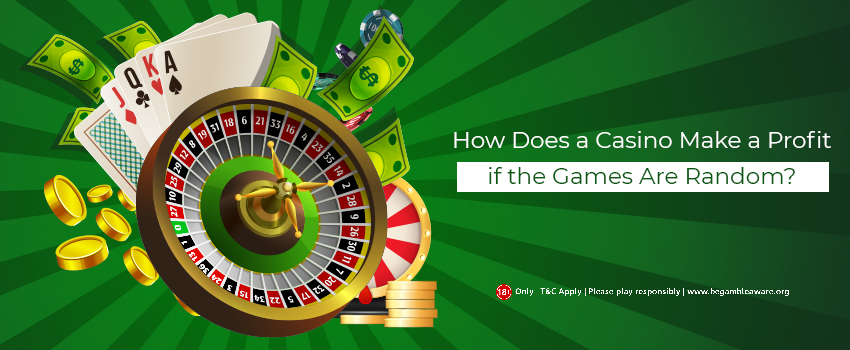How do casinos make profits from random games ?
Casinos have simple means of making a profit and keeping their games completely random. They make a profit by offering games of chance where the average payouts are lower than the income produced by the overall wagers. Exactly how this process is accomplished is briefly explained below.

What Are Odds and How Do They Work?
Probability is the ratio that compares the number of ways a specific event can happen with the number of ways it cannot happen. Odds are a way of explaining how much your bet will pay off. The way the casino makes its profit is by paying you earnings that are lower than the odds that would make a game break-even. For example, if the casino made you risk $55 to win $50 on a coin toss, in the long run, the casino would make a profit. 50% of the time, they will lose $50. The other 50% of the time, they would win $55.
The Infamous House Edge
In each bet, the casino usually has a statistical advantage in which they can make more money. This is called the house edge. The theoretical advantage that the casino holds in a game is what makes the game a gamble. The outcome is unknown and either party has an equal chance of gaining at any time. There are two sides to the house edge. The casino win is the total amount of money that the casino is left with after all the players have paid their bets.
The Effect of Short Term Variance
So the question arises why people still gamble on casino games if this is how the bets are set up, and most people know it? There are 2 reasons for this.
- The first being that very few casino players (both at land-based casinos and online casinos) understand how the math behind these games works.
- The second is that you are dealing with random events. So in the short run, anything can happen. Sometimes you might gain. And sometimes you might gain more often than you statistically should in the short term. This short term variation is what gamblers call “luck”.
The Casino Advantage in Blackjack
Blackjack is a unique casino game because players are not fighting a fixed house edge. The house edge in Blackjack varies throughout the game. It changes as the composition of the shoe changes because small cards help the dealer while Aces and ten-value cards benefit the player.
Additionally, the dealer is always the last person at the table to act on their hand, which significantly adds to the casino’s advantage. When a player hits their hand and goes over 21, they lose their bet even if the dealer busts afterwards. It has been estimated that in a fair game of blackjack, the probability of the player gaining a hand is around 44% whereas the likelihood of them losing the hand to the dealer is roughly 47%.
Casino and Craps
Craps is known for being an exciting game and for having a wide variety of bets you can make. But every bet at the Craps table pays off at less than the odds of winning. The only bet where that is not true is called the odds bet. But to place that bet, you must have first placed a bet on the pass line or the do not pass line. These bets give the house an edge of 1.41% or 1.36%.
The House Edge in Roulette
Roulette is a simple game. There is a spinning wheel with 38 possible outcomes. The pockets in this wheel are numbered 0, 00, and 1-36. The 0 and the 00 are both green, half the numbers 1 through 36 are black, and the other half are red.
There are a variety of roulette bets available, but all of them share the same house edge except for one bet. The easiest bets which win the most often, are the even money bets.
Payout in Slots and Video Poker
Each of the potential payouts on the pay tables of slot machines and video poker has a probability. The payout for that possibility is always lower than the probability of you hitting it.
One huge difference between machines like slots, video poker and table games is that the payouts for table games are made on an “X to Y” basis whereas, for a gambling machine, the payouts are made on an “X for Y” basis. For example, a payout on a single-number roulette bet is 35 to 1. This means that if you lose, you will lose $1. But if you win, you will keep your bet, and you will win $35 on top of it. But with games like slots, if you lose, you lose the amount you bet and if you win, you get the winnings only. You do not get your original bet back on top of it. You have to trade your wager for the earnings.
The Upper Edge in the Long Run
The answer to the question of why casinos profit from random casino games is simple. They offer payout odds that are lower than the odds of winning. In the short run, you can still gain in a situation like that, but in the long run, the casino will always have the upper hand. You can think of this disparity between the payout odds and the odds of winning as the house edge. Playing casino games (be it at land-based casinos or online casinos) can be fun, exciting and thrilling but in the long run, you need to remember the casinos always have the edge.

